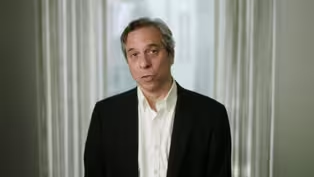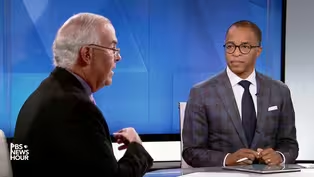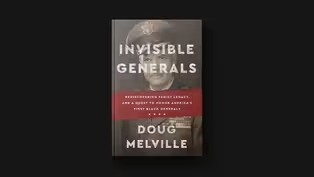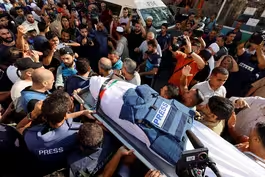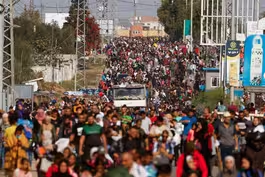
Survivors, rescuers recount horrors of Hamas festival attack
Clip: 11/10/2023 | 8m 7sVideo has Closed Captions
Survivors, rescuers in Hamas music festival attack recount the day’s horrors
The day that started the Israel-Hamas war, Oct. 7, was a day of horrific carnage and terror, and nowhere more so than at the Nova music festival in southern Israel. Hamas attackers shattered the desert rave at dawn, killing hundreds and taking many hostage. Leila Molana-Allen speaks with survivors of the massacre, and those who rushed to help.
Problems playing video? | Closed Captioning Feedback
Problems playing video? | Closed Captioning Feedback
Major corporate funding for the PBS News Hour is provided by BDO, BNSF, Consumer Cellular, American Cruise Lines, and Raymond James. Funding for the PBS NewsHour Weekend is provided by...

Survivors, rescuers recount horrors of Hamas festival attack
Clip: 11/10/2023 | 8m 7sVideo has Closed Captions
The day that started the Israel-Hamas war, Oct. 7, was a day of horrific carnage and terror, and nowhere more so than at the Nova music festival in southern Israel. Hamas attackers shattered the desert rave at dawn, killing hundreds and taking many hostage. Leila Molana-Allen speaks with survivors of the massacre, and those who rushed to help.
Problems playing video? | Closed Captioning Feedback
How to Watch PBS News Hour
PBS News Hour is available to stream on pbs.org and the free PBS App, available on iPhone, Apple TV, Android TV, Android smartphones, Amazon Fire TV, Amazon Fire Tablet, Roku, Samsung Smart TV, and Vizio.
Providing Support for PBS.org
Learn Moreabout PBS online sponsorshipGEOFF BENNETT: The day that started the war, October 7, was a day of horrific carnage and terror, and nowhere more so than at the Nova Music Festival in Southern Israel.
The rave in the desert was shattered at dawn by Hamas attackers.
Hundreds were killed and many hostages taken.
Leila Molana-Allen has been speaking with survivors of the massacre and those who rushed to help.
And, again, the images and accounts in this story are disturbing.
LEILA MOLANA-ALLEN: The final carefree moments of dancing until dawn.
As the sun rose on October 7, revelers at the Nova Music Festival heard a sound they never expected, gunfire.
Laura and her husband ran for shelter in the only place they could, their camper van.
For hours, they hid, unable to block out the sounds of terror and murder outside.
LAURA BLAJMAN KADAR, Nova Festival Survivor: The soldiers tried to open the door.
That moment, my husband looked at me and told me, "Well, this is it."
And my husband and I looked at each other and he told me he loved me.
I told him I loved him.
And I closed my eyes.
LEILA MOLANA-ALLEN: At that moment, the Israel Defense Forces finally arrived.
LAURA BLAJMAN KADAR: And then I opened the door to hell.
There were dead people in each car, people that were hiding inside a car, next to the car.
And my husband drive between dead bodies and between burned cars.
LEILA MOLANA-ALLEN: Laura came back today to find her van.
Seeing it has compounded her despair.
LAURA BLAJMAN KADAR: It's getting harder every day.
You understand better every day what happens, and you miss your dead friends every day a little bit more.
LEILA MOLANA-ALLEN: Hundreds of vehicles are still being brought to this graveyard of cars on Israel's southern border with Gaza.
Many bear the scars of bullet holes and explosives, where festivalgoers were attacked as they tried desperately to flee.
Twenty-three-year-old Amit Ganish and her friends were ambushed by terrorists as they tried to escape.
AMIT GANISH, Nova Festival Survivor: Everybody that were alive in the car just ran.
I ran through the forest, and I ran like this, because they were shooting after me.
LEILA MOLANA-ALLEN: And your friend's boyfriend was shot.
AMIT GANISH (through translator): They killed everyone and even set the car on fire.
Only after five days, we realized he was dead.
They found a very, very small piece of his brain and teeth, and there was no real grave to mourn for him.
LEILA MOLANA-ALLEN: For nine hours, Amit and her best friend, Zohar, hid inside a small bush, barely breathing.
AMIT GANISH (through translator): I heard everything, all the screams of everyone.
And I was in despair.
I believed I was going to die that day.
I knew I was going to die and said goodbye to everyone.
LEILA MOLANA-ALLEN: Like many survivors, Amit was saved not by the IDF, but by an Israeli citizen who ran straight toward the danger to help.
Eran Massas woke that morning to find his country under attack.
Barely thinking, he grabbed his gun and began to drive.
ERAN MASSAS, Municipal Worker: After a kilometer or something like this, one of the terrorists came in front, of me and I understand the situation, and I said to myself, OK, I'm in a war.
LEILA MOLANA-ALLEN: He shot the militant and drove on.
As word spread, Eran's phone began to fill with pleas for help from parents he'd never met.
ERAN MASSAS: "(INAUDIBLE) location.
Is hurt from a gunshot in his back."
Names.
"I don't know who are they."
LEILA MOLANA-ALLEN: For hours, Eran drove back and forth, seeking out young people hiding in terror across the plains.
Then, suddenly, a parent Eran did know, an old friend from his army days called.
ERAN MASSAS: "Eran, help me.
Omri (ph), my son inside.
You know him.
You know him when he was a baby."
And then when I walked around, I saw Omri dead.
And I told him: "I have not found him."
I told him: "I have not found him.
I cannot see him.
Maybe later.
I call you later."
And Omri dead.
He sent me a message after three days that they found Omri.
But I know.
I already knew.
LEILA MOLANA-ALLEN: As Eran approached the central site of the festival, the scale of the horror began to unfold before his eyes.
ERAN MASSAS: I start shouting: "Who is alive?
If there are any lives, if somebody heard me, just look at me."
And then I saw body after body and after body.
LEILA MOLANA-ALLEN: The further he walked, the darker the nightmare became.
ERAN MASSAS: There is a group of people who started run.
They fell.
They just take the gasoline from the generator of the lights to the party, and they burned them.
This is children.
LEILA MOLANA-ALLEN: So these kids were trying to escape.
ERAN MASSAS: That's right.
LEILA MOLANA-ALLEN: And they captured them and they burned them alive?
ERAN MASSAS: That's right.
LEILA MOLANA-ALLEN: Having saved as many of the living as he could, next, Eran stayed to help the dead.
ERAN MASSAS: This is the truck that I took from the party with that, and I just put inside dead bodies.
All my uniform was on blood.
LEILA MOLANA-ALLEN: You were covered in blood?
ERAN MASSAS: Of course.
There was 100 bodies that I took with my both hand.
LEILA MOLANA-ALLEN: Eran immediately rejoined the army after the attacks, but, that day, he was all alone.
Back home with his four young children, he's trying to process the burden of such loss.
ERAN MASSAS: When I think about my children, it breaks my heart, because it's not easy.
It's really not easy.
I guess every parent in the world, every human being, to see so many deaths, so many blood in one place, in one moment, it's not humanity.
It's not humanity.
LEILA MOLANA-ALLEN: Each survivor is trying to find their own way back to humanity.
At this pop-up healing center outside Tel Aviv, dozens of therapists have volunteered to help.
LEAH ORR, Natural Therapist: The few people that came on the first day were hollow.
It was like death was all around them.
LEILA MOLANA-ALLEN: Here, they're slowly learning to feel safe in their bodies and minds again, their souls, and to dance to the music they went to share in love, but ended in hell.
LEAH ORR: So much evil.
They saw so much evil and so much darkness.
And for a lot of them, it's hard for them to get back to life or to feel that they're allowed to be happy in other places.
But, here, it's healthy and it's healing and it's life.
LEILA MOLANA-ALLEN: But in a country where everyone has been touched by this tragedy, many are not yet ready to begin healing.
When Eran closes his eyes at night, the images play over and over.
ERAN MASSAS: What I see is not normal people.
I see it with one -- with not an eye, with not a mouth, with not -- and I wake up.
Every day for the last months, this is what I see.
LEILA MOLANA-ALLEN: Tomorrow, Eran is being deployed to fight in Gaza.
His battle is far from over.
For the PBS NewsHour, I'm Leila Molana-Allen in Haifa, Israel.
A Brief But Spectacular take on how to rebuild local news
Video has Closed Captions
Clip: 11/10/2023 | 3m 12s | A Brief But Spectacular take on how to rebuild local news (3m 12s)
Brooks and Capehart on takeaways from the 2023 elections
Video has Closed Captions
Clip: 11/10/2023 | 11m 28s | Brooks and Capehart on 2023 election takeaways and Manchin’s Senate shakeup (11m 28s)
High demand for new RSV drug for infants outpaces supply
Video has Closed Captions
Clip: 11/10/2023 | 5m 49s | High demand for new RSV treatment for infants outpaces national supply (5m 49s)
‘Invisible Generals’ tells story of 1st Black U.S. generals
Video has Closed Captions
Clip: 11/10/2023 | 7m 45s | ‘Invisible Generals’ chronicles little-known history of 1st Black U.S. generals (7m 45s)
Israel-Hamas war takes deadly toll on journalists
Video has Closed Captions
Clip: 11/10/2023 | 6m 4s | Israel-Hamas war takes deadly toll on journalists covering the conflict (6m 4s)
Thousands flee Gaza hospitals as Israeli troops close in
Video has Closed Captions
Clip: 11/10/2023 | 4m 27s | Thousands of civilians flee northern Gaza hospitals as Israeli troops close in (4m 27s)
Providing Support for PBS.org
Learn Moreabout PBS online sponsorship
- News and Public Affairs

FRONTLINE is investigative journalism that questions, explains and changes our world.

- News and Public Affairs

Amanpour and Company features conversations with leaders and decision makers.












Support for PBS provided by:
Major corporate funding for the PBS News Hour is provided by BDO, BNSF, Consumer Cellular, American Cruise Lines, and Raymond James. Funding for the PBS NewsHour Weekend is provided by...
